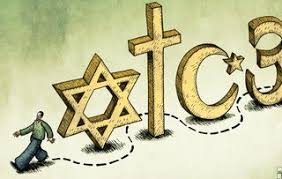By: Ananya Chaturvedi
Religion is the most comprehensive and intensive manner
of valuing known to human beings. There are many definitions
of religion. It is not that easy to pin down exactly what religion
is as there are many different cultural manifestations of
religion.
It is a rather common misconception to think that religion has
to do with god, or gods and supernatural beings or a
supernatural or spiritual dimension or greater reality. None of
that is absolutely necessary because there are religions that
are without those elements.
The word religion comes from the Latin word religare, which
means “to bind.” A religion, therefore, is a set of beliefs that
bind the believer. Religion imposes a kind of rule or regulation
upon the believer’s life.
Concurrently, they’re saddened because millennials also seem
to be one of the most troubled generations. Its members seem
to be more prone to giving in to despair, compared to previous
generations of young adults.
With the cynical connotations that surround religion, charged
by negative media coverage of religion and spirituality, how it is
helping young people deal with complications in their lives is
seldom considered. The trend toward non-religiousness in this
generation is probably here to stay.
Other reasons for non-religiosity are cultural. Religious
commitment tends to be more intense when communities are
homogeneous because they can avoid being challenged by
conflicting beliefs or value systems. Exposure to diverse
perspectives challenges the claims of any particular worldview,
which is why people in multicultural, cosmopolitan societies
tend to be less religious. Gen Z is the most ethnically, racially,
and religiously diverse generation
Millennials live in a culture of choice, self-actualization, and
freedom of expression. But all our ideas will be in a wrong
perspective if we think that this recurring perplexity was
confined to contradictions between religion and science, and
that in these controversies religion was always wrong and
science always right. The true facts of the case are very much
more complex, and refuse to be summarized in these simple
terms.
In this age of globalisation, everything is standardised and
homogeneous. Individual identities are being wiped out and
society is becoming faceless. The need to stand out to retain
one’s individuality is ever rising. As a result of these and other
causes, Gen Z is interested in equality, safety, the environment,
and helping the less fortunate.
The Indian youth is complex, many-layered, varied, often
carrying the remains of the past and clinging to traditions, and
yet forging ahead, pressing elevator buttons, breaking a few old
rules, and making new ones.
Once I was sitting with a few friends and discussing about
belief and one of them quoted Dalai Lama, “ there is no need
for temples, no need for complicated philosophies. My brain
and my heart are my temples; my philosophy is my kindness.”
This is something I will never forget because you read
something, understand something and implement an entirely
different thing. Sadly, the millennials go by the truth which is
not likely in the favour of their cultural circumstances and lack
a metaphysic to wish they can hook their beliefs.



Feed from WhatsApp